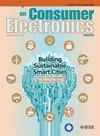Hierarchical Continual Learning for Domain-Knowledge Retention in Healthcare Federated Learning
IF 10.9
2区 计算机科学
Q1 ENGINEERING, ELECTRICAL & ELECTRONIC
引用次数: 0
Abstract
Internet of Medical Things (IoMT) applications encounter issues with data protection, continual adaptation, and domain-specific knowledge retention, especially in consumer-centric IoMT scenarios. We overcome these obstacles and facilitate effective knowledge retention and task adaptation in IoMT applications. This study attempts to create a unique privacy-preserving federated learning framework that combines a hierarchical learning structure with Continual Learning (CL). Despite the advancements in Federated Learning (FL), current models have trouble integrating changing datasets in real-time while protecting privacy, as well as catastrophic forgetting, which occurs when previously learned knowledge is lost when adjusting to new tasks. We present a hierarchical learning framework that makes use of three levels of models - Junior Model (JM), Consultant Model (CM), and Senior Consultant Model (SCM) - to overcome these drawbacks. Each level of the model aids in archived retention and domain-knowledge adaptation. To guarantee that the model maintains valuable information over time and adapts to new tasks with ease, our method blends domain adaptation strategies with ongoing learning approaches like knowledge distillation and elastic weight consolidation (EWC). We compare the suggested methodology with current state-of-the-art (SOTA) models on healthcare datasets for tasks like illness diagnosis and medical image categorization. According to our findings, the hierarchical continual learning model performs better than SOTA techniques in terms of accuracy, task adaptability, and privacy protection. In the healthcare industry, our study sets a new standard for privacy-preserving, continuously adaptable federated learning systems, allowing for real-time, scalable IoMT applications that can adapt dynamically to a variety of changing datasets.医疗保健联邦学习中领域知识保留的分层持续学习
医疗物联网(IoMT)应用程序遇到数据保护、持续适应和特定领域知识保留等问题,特别是在以消费者为中心的IoMT场景中。我们克服了这些障碍,促进了IoMT应用中有效的知识保留和任务适应。本研究试图创建一个独特的隐私保护联邦学习框架,该框架将分层学习结构与持续学习(CL)相结合。尽管联邦学习(FL)取得了进步,但目前的模型在实时整合不断变化的数据集、保护隐私方面存在问题,而且在适应新任务时,以前学过的知识会丢失,这也会导致灾难性的遗忘。我们提出了一个分层学习框架,利用三个层次的模型——初级模型(JM)、顾问模型(CM)和高级顾问模型(SCM)——来克服这些缺点。模型的每一层都有助于存档的保留和领域知识的适应。为了保证模型随时间保持有价值的信息并轻松适应新任务,我们的方法将领域适应策略与持续学习方法(如知识蒸馏和弹性权重巩固(EWC))混合在一起。我们将建议的方法与当前最先进的医疗数据集(SOTA)模型进行比较,用于疾病诊断和医学图像分类等任务。根据我们的研究结果,层次持续学习模型在准确性、任务适应性和隐私保护方面优于SOTA技术。在医疗保健行业,我们的研究为隐私保护、持续适应的联邦学习系统设定了一个新标准,允许实时、可扩展的IoMT应用程序动态适应各种不断变化的数据集。
本文章由计算机程序翻译,如有差异,请以英文原文为准。
求助全文
约1分钟内获得全文
求助全文
来源期刊
CiteScore
7.70
自引率
9.30%
发文量
59
审稿时长
3.3 months
期刊介绍:
The main focus for the IEEE Transactions on Consumer Electronics is the engineering and research aspects of the theory, design, construction, manufacture or end use of mass market electronics, systems, software and services for consumers.

 求助内容:
求助内容: 应助结果提醒方式:
应助结果提醒方式:


